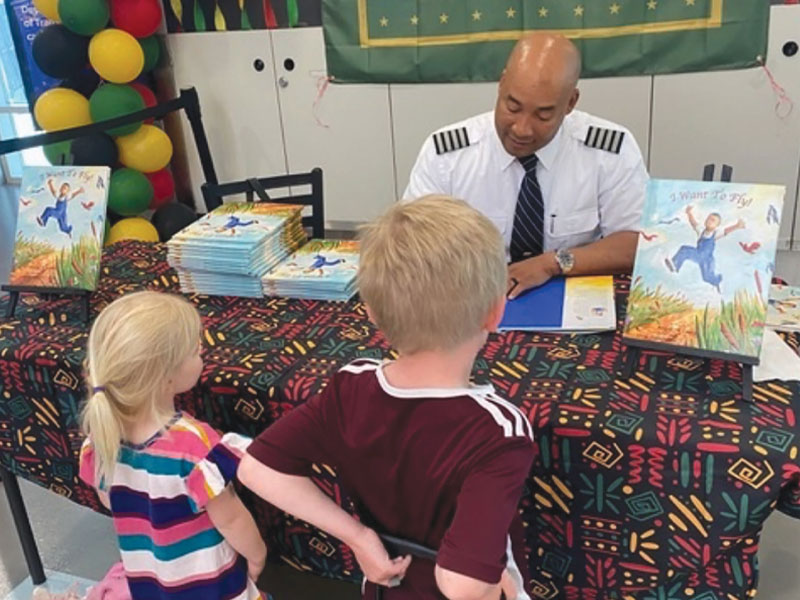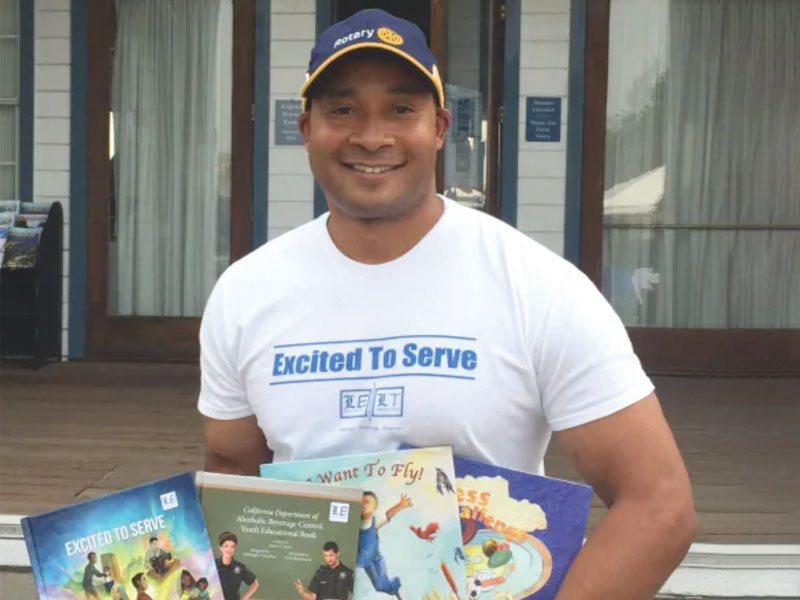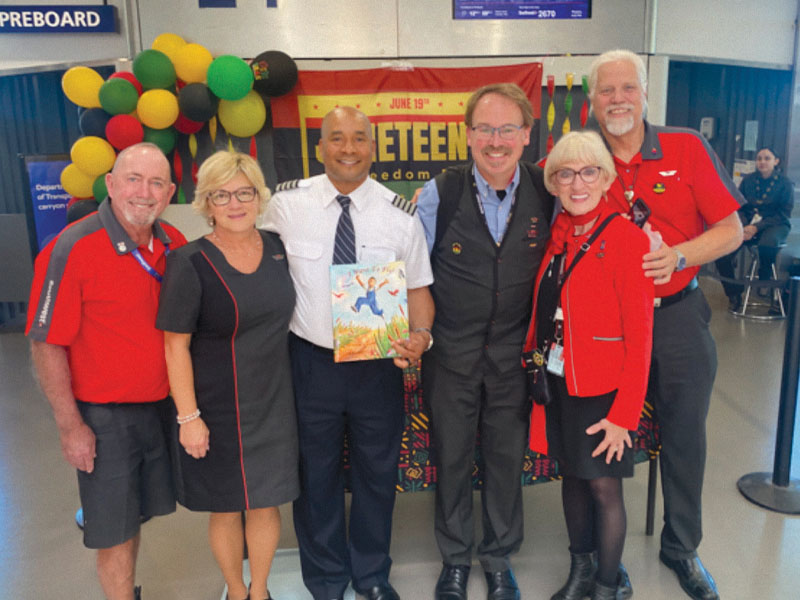FedEx Pilot Teaches Life Skills to Children Through Books
By John Perkinson, Senior Staff Writer

Capt. André Lewis (FedEx Express) autographs a copy of his storybook, I Want to Fly, for a young reader.
Capt. André Lewis (FedEx Express) is a man on a mission. When he isn’t flying cargo to the four corners of the earth, he’s supplementing the education of school children through a series of illustrated storybooks he’s written to communicate important life lessons. The award-winning author has written 26 books that explore themes ranging from proper oral hygiene to understanding the basics of finances to making a difference in the community.
Lewis shares his books as part of classroom presentations he conducts to underscore valuable messages about self-esteem, social responsibility, and the importance of having goals. By doing so, he’s broadened the horizons of thousands of young people across the United States, as well as in Kenya, the Marshall Islands, and Mexico.
His first book, I Want to Fly, published in 2007, is both semiautobiographical and motivational. Growing up in Columbus, Miss., he often saw airplanes in the skies above and decided he wanted to become a pilot. In the book, a young child has the chance to ride in a crop duster and soon sets his sights on learning to fly.
“Life wasn’t always easy for me, but I had dreams to do more and to be more,” he remembered. “Despite some challenges, I wasn’t going to be deterred from pursuing my goals.” The Oakland, Calif.-based B-767 pilot acknowledged that he benefited from the help of teachers and many others who gave him valuable advice.
“Now it’s my turn to help the next generation live their dreams,” he said. “I hope that through my customized storybooks, I can help educate, encourage, and empower young people to believe in themselves and achieve their goals.”
Drawing Inspiration
A sixth-grade teacher noticed Lewis’s remarkable talent for math and suggested he consider a career in engineering. His suggestion helped the future FedEx pilot realize he’d need a college education to become an engineer.
While Lewis was a freshman in high school, he ran into a previous acquaintance from a rival high school. He noticed she was wearing an Air Force ROTC uniform. The young woman mentioned that she wanted to attend the U.S. Air Force Academy and planned to become a pilot. The more she talked, the more Lewis was enticed to pursue the same path.
When he acknowledged this shared interest, the woman remarked, “You can’t go to the academy because they only take the very best.” Rising to the challenge, he responded that he’d see her there. Three years later, Lewis was a freshman at the esteemed Colorado Springs, Colo., college.
During the last semester of his senior year, Lewis took a science-fiction class, which he said inspired his love for writing. Lewis also participated in the NEXUS Conference hosted by the academy that featured several noted science-fiction writers, including Ray Bradbury, author of The Martian Chronicles and Fahrenheit 451. As part of the conference, Lewis was one of four students selected to give a 20-minute presentation on a related paper he’d written.
In his paper, Women in Science Fiction: Past, Present, and Future, Lewis asserted that how authors portray women can influence who they become. “If you want a strong, positive society, it’s important to present strong, positive characters, especially when it comes to women,” he observed. Octavia Butler, an acclaimed writer and recipient of the Nebula and Hugo Awards for science fiction, also attended the event and encouraged Lewis to keep writing.
Lewis graduated with a bachelor’s degree in astronautical engineering in 1989. He flew the Lockheed C-141 Starlifter for the U.S. Air Force for nearly eight years before transitioning to FedEx Express in 1998. In addition, he earned a master’s degree in business administration from Webster University. During this time, Lewis was also active in several service and charitable organizations.
Giving Back
During a presentation at a Memphis, Tenn., junior high school, Lewis spoke to students about achieving their dreams through academic excellence. However, a carnival operating behind the school was distracting the children. When he asked if they’d rather learn about ways to improve their lives or attend the fair, they opted for the fair.
Wanting to be more impactful, Lewis spoke with a psychologist who suggested that to make a meaningful change in students’ lives, he’d need to reach them at a younger age. The psychologist told Lewis that after age 12, it takes a significant emotional event to modify an individual’s behavior. In response, he tried speaking to elementary-school students but quickly learned that after several minutes, it was just as difficult to hold their attention.
After careful consideration, Lewis decided to develop illustrative books to go along with his presentations. The subject matter, combined with corresponding imagery, would help him better communicate his messages.
“Eight to nine seems to be the optimum age for students to be interested in and comprehend the subjects of my books,” Lewis noted. His books also contain resources for parents, enabling them to reinforce these same messages at home.
Managing Outreach Costs
Lewis initially paid for much of the expense of producing the books and giving them away for free. However, demand soon increased, compelling him to find better ways to finance and deliver his storybooks.
In 2005, Lewis founded Literary Engineers, a for-profit book publisher. Eleven years later, he established Literary Tools, a 501(c)(3) nonprofit, to help coordinate funding. “We’re creating tools for school groups, providing businesses ways to give back, and helping other organizations make a difference in the communities they serve,” he said. And with his drive and positive attitude, he continues to find new sources of investment.

Lewis displays some of his books at a Community Day Celebrating Literacy hosted by Literary Tools.
Lewis created a customized book, Making It Better in Vallejo, highlighting the Vallejo Police Department (VPD), in Vallejo, Calif. For the last three years, third graders in the district have attended presentations by VPD law enforcement officers. After the talks, many of the students line up for police autographs and photos, and the books are theirs to keep.
“The entire activity was designed to improve the relationship between law enforcement and kids,” Lewis observed. The events have been a huge success, and the books were financed through a variety of sources, including the VPD’s asset forfeitures.
Financing for some of Lewis’s books comes from resources such as the 21st Century Community Learning Centers Program, established by Congress to award grants to rural and inner-city public schools.
During the COVID-19 pandemic, it became difficult for Lewis to continue his philanthropy. To meet this new challenge, he created an online “literary portal” as a means of giving kids electronic access to books and resources. Lewis’s online storybooks are presented in English and Spanish, and several include a voice-over feature.
Making a Personal Connection
After giving a presentation at a school in Casper, Wyo., one of the parents walked up to Lewis and said, “I want to thank you for what you did for my daughter.”
The previous year, the woman’s daughter had attended one of Lewis’s presentations. She had issues with her right arm and Lewis rolled up his sleeve to show the girl third-degree burn scars he has on his right arm. “You and I are just the same,” he told her. “If I can make my dreams come true, so can you.” The two then took a photo together.
The mother later made a poster of the photo and put it on her daughter’s wall. The girl posts information about her personal goals all around it. Whenever she has a bad day, she stares at the image and remembers that all things are possible.
“It’s humbling for me to hear that my books are making a difference. My whole purpose is to help people,” Lewis acknowledged.

Lewis poses with Southwest Airlines employees following an event at Oakland International Airport where he distributed his books.
Lewis now has his sights set on helping more people get involved and making a difference. Last June, he partnered with Southwest Airlines Oakland hub and donated more than 300 books to Southwest employees and their passengers. “Seeing so many smiles was contagious,” Lewis remarked. While he realizes that he can’t be everywhere, Lewis appreciates that so many people want to help improve conditions in their communities.

